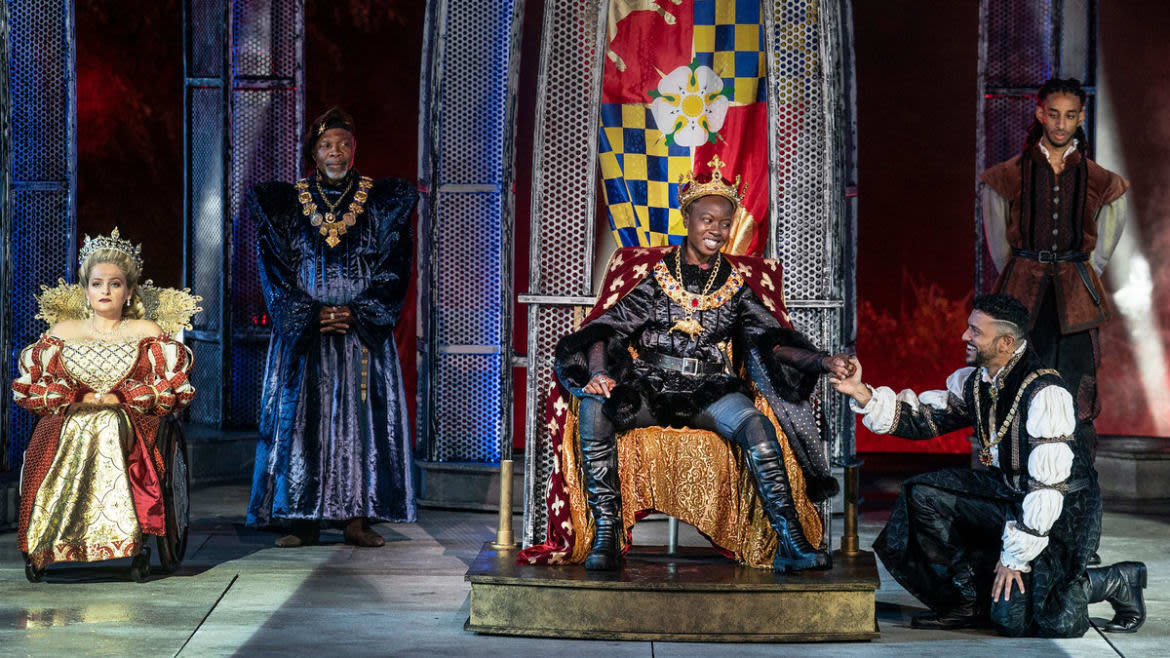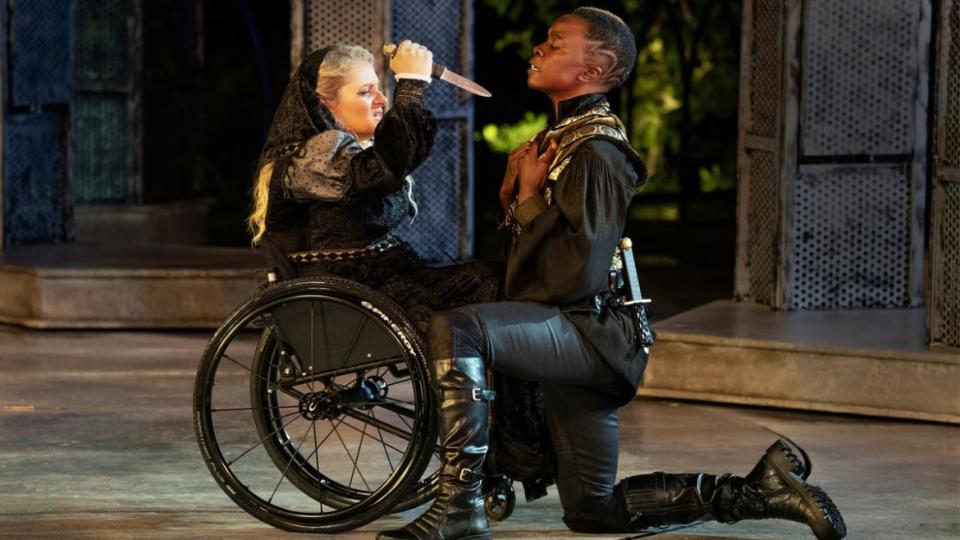‘Richard III’ Is a Tame Game of Thrones at Shakespeare in the Park

- Oops!Something went wrong.Please try again later.
- Oops!Something went wrong.Please try again later.
- Oops!Something went wrong.Please try again later.
The body count rises as expected in Richard III, even if we barely see it. We are never in any doubt about the title character’s anger and capacity for viciousness thanks to Danai Gurira’s balance of ruthless focus and shameless guile in portraying the bloody chess game methodology behind his ascent to the throne.
Gurira could not look and seem more different than the “deformed, unfinish’d” protagonist that Shakespeare imagined. In this Free Shakespeare in the Park production (opening today at the Delacorte Theater and running only to July 17, so you will have to get your skates on), Richard is a smooth, power-hungry player from the get-go. Gurira recently told NPR that the gender-crossing casting choice had made it interesting to explore “toxic masculinity” as a perpetrator instead of an object.
“Is there a different experience the audience has when they hear misogyny come through a female body? Does it highlight it more? Does it sharpen it in terms of how grotesque it is? And I hope it does,” she told NPR.
“Richard’s otherness is his Blackness in this world,” director Robert O’Hara said. (His diverse cast includes actors with various disabilities in a production that deliberately makes Richard’s disabilities psychological rather than physical.) Gurira added of her Richard, “He’s dealing with the otherness compared to his family, in terms of not being Caucasian and fair like them.”
‘Merry Wives’ Heralds Shakespeare’s Raucous Return to Central Park
The play begins not with the sonorous “Now is the winter of our discontent,” but with Richard dispatching Henry VI (“Down, down to hell, and say I sent thee thither”) as a kind of murderous amuse-bouche.
One standout performance is Sharon Washington as Queen Margaret (widow of Henry VI); her key early speech, laying starkly clear her condemnation of Richard, is so stunningly delivered it gets the kind of applause from the audience usually reserved for an 11 o’clock musical number. Tony winner Ali Stroker as Lady Anne is a perfect, steely combination of dueling wit and later anger, as Richard seeks to seduce her for his own ends. Sadly, like Washington, we do not see much of her.
Myung Hee Cho’s design and Alex Jainchill’s lighting also deserve applause. The boon and challenge for every performer and creative professional working on Shakespeare in the Park is how to make the most of the surroundings, with the stage giving way to the towering trees and foliage of Central Park beyond.
Here the stage is made of what looks like the components of a crown to show us the tortuous and fractured games of thrones that Richard is engaged in to maintain power. It’s one of the most clever and effective stage designs this critic has ever seen in the park. These structures rotate to create a series of imagined rooms, entrances, and exits and are beautifully lit against the dying light and then inky night. The production also makes imaginative use of the grand folly of Belvedere Castle in the distance. If the script says “castle,” there’s your castle! It even has flags fluttering on top.

Ali Stroker, left, and Danai Gurira in "Richard III."
These visual pleasures are important, because part of the fun of Shakespeare in the Park is sitting there, enveloped in the play, as night falls (good news: the concession stalls are back, with snacks and frosé). Also, as a play Richard III is repetitious: there are the murders that Richard oversees to maintain power, which happen mostly off stage, with the assistance of loyal cousin Buckingham (Sanjit De Silva), alongside Richard's near-constant regaling of us with his plans. Many characters see right through him and are yet powerless to stop him (until the end).
Unlike in say King Lear, the horrors here feel predictable, inevitable, and far away—a procedural conveyor belt of strangely tension-free calumnies that are described and relayed rather than shown or felt. Gurira is our intimate, delighting in the cunning that Richard stoops to, and then telling us all about what Richard is up to as if she were writing a kind of regicidal handbook. This proud and boastful commentary to the audience only ceases when his plans start to implode, and Richmond (Gregg Mozgala) enters the fray to stymie his plotting and bring the battle for the throne to its head.
O’Hara seems steadfastly uninterested in showing us violence. The few on-stage killings are done in hurried parentheses, with an aesthetic reliance on lighting and the benefits of a central portion of the stage that opens and closes to unseen depths. In many ways, this is a very traditional production, which makes it all the more surprising when Gurira appears in the audience at a key moment, with us suddenly the people of the land seeing her swagger, fork-tongued charm, and glinting charisma up close.
In this very decorous Richard III, a few more mischievous and earthy jolts like that would not go amiss. The play also feels oddly out of time, when Shakespearean villains talked double to get what they wanted, played now in an age where the worst of our rulers are proud to make it blatantly clear what they are prepared to do to gain and maintain power.
Get the Daily Beast's biggest scoops and scandals delivered right to your inbox. Sign up now.
Stay informed and gain unlimited access to the Daily Beast's unmatched reporting. Subscribe now.

